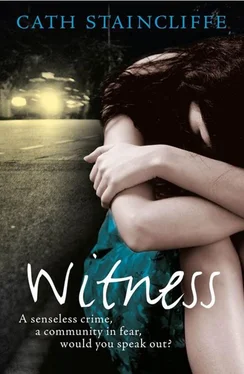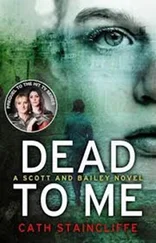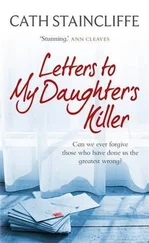Apprehension wormed about in her stomach and her back was stiff, her thoughts edgy, as she set out. She watched Ziggy trot from scent to scent and they made their way to the nature reserve. There were blackberries, fat and shiny, alongside the path and she had a spare plastic bag in her pocket. She tasted one, the flavour deep and fruity, a perfect mix of sweet and tart. She picked lots, savouring the occasional bite of a thorn from the brambles, her fingers turning purple, gritty with specks leftover from the flowers. She attained a sort of equilibrium. When the bag was half full, she stopped. The juice drying on her hands was sticky.
Sticky like blood. A stab of horror. She flashed back to that day, the shower, peeling the tights from her knees. His eyes, the boy’s eyes. She slewed her mind away, catalogued what she could see, determined to root herself in the here and now. The horse-chestnut cases still green and heavy in the tree; the sycamore leaves dying at the edges, splashed with sooty fungus, tar spot, there every year, though it never harmed the trees; the hen blackbird, dusty brown, seeking food in the mulch beneath the hedge; the whine of a wasp, drunk on rotten fruit. The gradual dying of the year. But this would all renew, return. This was her church. She fought for control and clung to her harvest. With some apples she could make a pie, or a crumble. She wiped her fingers on a tissue, texted Owen, asked him to get some Bramleys and some cream; there was a small supermarket on his way home.
Walking back, Fiona ran into the old American couple with their terriers. She smiled and nodded, her teeth clenched as they nattered about the weather and the deterioration in the quality of the kennels they used. By the time they moved on, her jaw ached with the effort. But she had coped.
Owen arrived back without any apples or cream.
‘Oh, brilliant!’ She rounded on him. ‘I texted you.’
He stared at her, affronted. ‘I didn’t get any text.’
‘How come?’ she demanded. ‘How come you never get my texts? Or do you just ignore them?’ Her voice rising. ‘I can’t make apple and blackberry pie with no bloody apples.’
‘Big deal.’ He slung his bag down, kicked off his shoes.
‘Pick them up,’ she yelled. ‘Put them away.’ She heard the shrill of her tone, hated it.
Owen flushed, glared at her from under his fringe.
She put a hand out, grabbing the post at the bottom of the stairs. ‘Look, I’m sorry. It happened again,’ she said quietly. ‘In the post office, another panic attack.’
‘Not my fault,’ he muttered and went upstairs, leaving his bag and shoes where he’d dropped them.
Three weeks after the post office and she was feeling much better. The medication seemed to be doing its work. She had some minor side effects, nausea and a dry mouth, but overall she felt calmer and safer. She was doing her best to keep a structure to her day. In the morning she did chores, the ongoing housework, then all the things there had never been enough time to do. She was clearing the spare room, sorting through old sports equipment and extra duvets, games and toys that Owen had outgrown, spare shoes. She found a set of watercolours and dabbled at them but her efforts only irritated her. The daubs on the page bore no resemblance to the pictures in her head. They’d been a present for Owen but he’d never shown any interest. If Owen had an artistic bone in his body it was a small and well-hidden one.
The idea of learning a craft, finding a hobby, appealed to her. Something for the afternoons, and those evenings when she wasn’t interested in what was on television. At school she’d loved pottery, the heft of stone cold clay in her hands, the giddy spinning wheel, the magic of the kiln. They’d made coil pots and ornaments, hedgehogs and little dishes shaped like leaves. Pedestrian. But she’d used clay for her O level art project. Made a large vase, the green slip glaze on it luminous, as vibrant as she could get it. Her parents had displayed it on their sideboard but she’d no idea what had happened to it. After they’d both died, when she’d cleared out her mother’s retirement flat, there’d been hardly anything left.
Pottery was impossible on her own at home. No wheel or kiln. The only place would be a night class and that meant going out, meeting people. That frightened her. She completed jigsaws and worked in the tiny back garden. She tried sudoku and crosswords but the afternoons began to yawn and her walks with Ziggy grew longer.
Since the post office she practised walking to the local shops and back every other day. Her own form of behavioural therapy. At first just there and back. Then going into one place and buying something. Then a couple of places. She managed fine. Taking things gradually and helped by the medication, she grew more confident.
Shelley had been more than happy to come round and visit. But she thought Fiona might try going out with her now. A meal maybe? Fiona liked the idea. She was lonely and the thought of Shelley’s anecdotes from work, gossip about the other staff, her smiles, a restaurant meal, would be a welcome change. Would Shelley come to Chorlton, so Fiona could walk there? Could they meet early before it got too busy? Sure. Shelley agreed to all her conditions.
Fiona never even made it to the restaurant. And what made it most devastating, once she’d weathered that black, bleak, overwhelming anxiety and the indignity of cracking up in public, was the fact that there was nothing, not one, single, identifiable element that she could seize on to explain why the attack had come on in that place, a quiet junction of two suburban side streets, or at that time. If there was no particular trigger that set her off then she could be rendered disabled and petrified, suffocating and gripped by dread, anywhere, any time. Nowhere was safe.
Mike
With the neck brace on and a sling to support his dislocated left shoulder, Mike wouldn’t be up for driving for several weeks. Ian told him he’d have to let him go. Lay-offs were on the cards anyway and it wouldn’t be fair to the other lads to keep Mike’s place open when he couldn’t pull a fair day’s graft. Mike could hear the relish in Ian’s voice, bubbling under the surface of the words. Ian ran on spite: Mike knew his boss had never forgiven him for the missed deliveries on the day of the murder. And now Ian had his revenge.
‘I’ll try the post,’ Mike told Vicky. ‘See if anything’s coming up for when I’m fit.’ But they were letting people go, too. Combining rounds so posties had longer routes, longer hours, heavier mailbags. Some desk-jockey spouted how a walking pace of four miles an hour should be standard in the postal service, it would improve efficiency and keep the staff fit.
Mike tried the other contacts he had but it was the same story everywhere: short rations, hard times.
He went down the Jobcentre and found out what he could claim and when. He and Vicky spent a whole weekend filling in the forms. Pages and pages. They had to let the tax credit know their circumstances had changed. They applied for free school meals for the kids and got them. Mike had balked at that when Vicky first raised it.
‘School dinners?’ He looked at her.
‘Why the face?’
‘They’ll get picked on,’ he said. ‘The kids on school dinners, they were always the losers.’
‘That’s daft,’ Vicky countered.
‘Cheap pies and soggy mash,’ he tried, knowing that was a lost argument.
‘Not now. Decent meals. And they’d only need a snack at teatime. Every penny counts. We might get free uniforms as well.’
Mike ran a hand over his face and sighed, stared at the fridge behind her, the garish magnets and the kids’ paintings.
Читать дальше












